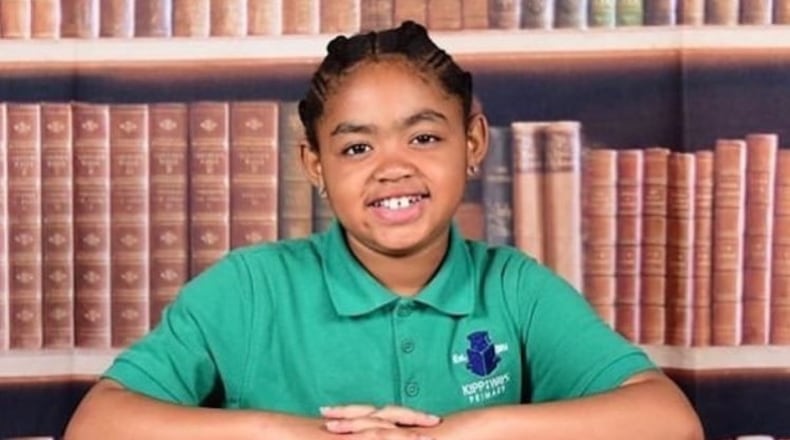In the weeks following the death of Rayshard Brooks, the streets near a southwest Atlanta Wendy’s where he was shot by an officer became a flashpoint in the nation’s ongoing protests over police violence.
Mixed in with the peaceful protesters was a threatening band of armed young men who blocked the street and seized a city block from authorities, effectively controlling at gunpoint who could come and go.
On Thursday evening, new GBI arrest warrants in the shooting death of 8-year-old Secoriea Turner revealed that some in the group were a violent street gang, the Bloods. They were part of an uprising in response to the death of Brooks, who was one of their own, according to a warrant.
Members of the gang were involved in burning the Wendy’s and they terrorized the area where Atlanta police officers were not allowed, according to the warrant.
“The Bloods gang and its associates operated the area as an ‘autonomous zone’ in which the sovereign authority of the City and State were not recognized, and the Bloods gang exerted all control,” according to the warrant filed this week.
The new public narrative involving the gang’s control of an Atlanta neighborhood is outlined in the GBI arrest warrant of one of two alleged gang members charged in Turner’s July 4, 2020, killing. It has renewed questions about Mayor Keisha Lance Bottoms and her administration’s management of the crisis that followed the Brooks shooting last year.
It was unclear Friday if public officials knew last year that armed men at the blockade were gang members. Police and other city officials would not directly address the issue.
Bottoms said in a statement Friday that the GBI “has not shared any direct information with me or members of our administration about the warrants they’ve issued.”
On Saturday after this story had been published, Bottoms, through a spokesperson, said she had been unaware of the gang presence last year.
Throughout the evening of July 4, 2020, gang members used weapons and intimidation to control the intersection, the GBI alleges. Three and a half hours before Turner was shot, several gang members pointed their guns at a MARTA bus and its driver as the vehicle came upon the barricade at Pryor Road and University Avenue. The episode was captured on video, records show.
Three hours later, a couple drove up to the barricade in their car and were stopped by two young men — one had a shot gun, the other a rifle. One of them, Jerrion Amari McKinney, 23, told the man he was “being disrespectful” and pointed his shotgun at him, a warrant says.
Three others surrounded the vehicle and forced the couple to turnaround, according to the warrant.
The car pulled into a nearby parking lot and the young man with rifle, Julian Jamal Conley, in his early 20s, approached the couple a second time and pointed his gun at them, a warrant alleges.
Minutes later, Turner and her family arrived at the barricade. When they tried to pass, two Bloods, Conley and McKinney displayed their weapons, a warrant alleges. As the family tried to drive around the barricade, the warrant says Conley opened fire with his AR-15-style rifle and struck the side and back of the vehicle. McKinney chased the vehicle down the road as it drove away, records show.
Since the new allegations of gang involvement became public on Thursday, some have pushed back against the GBI’s narrative.
In a statement, lawyers Chris Stewart and Justin Miller, who represent Brooks’ surviving relatives, said the family has “no knowledge or information regarding any alleged gang affiliation of Rayshard Brooks.”
Activist and civil rights attorney Gerald Griggs was at many of the protests during those weeks. Griggs said he didn’t view the gun-toting group who manned the barricades during the time he was there as anything other than “citizens of the neighborhood who were exercising their Second Amendment rights.”
The police, meanwhile, were held at bay by Bottoms, who told The Atlanta Journal-Constitution in July 2020 that she had wanted the area cleared weeks earlier but was dissuaded by City Councilwoman Joyce Sheperd, who had been negotiating with the protesters when the area was taken over. Sheperd declined to comment on Friday.
Last year, both Bottoms and Sheperd said they didn’t see the armed men after police removed the barricades on June 23. But armed gang members came back at some point. Turner’s family is suing the city over her death.
George Chidi, an independent journalist who used to work at the AJC, was beaten by some of the armed men when he was independently covering the protests last June. He said there was an organized hierarchy among those at the barricade, but he didn’t view them at the time as a gang.
Chidi said this week’s revelations, however, raise new questions that city officials need to answer. He said it would have been a significant breakdown in leadership if city officials knew last year that gangs were operating in the area and didn’t do enough to control them.
“Tremendous resources are placed in the hands of the police to ensure a base level of order in society,” said Chidi, who is Black. “That completely broke down over the course of several weeks.”
Fulton County DA Fani Willis at a press conference on Thursday discussed the latest twists in the case and how it reflects the significant gang problem in the metro area. In a separate case earlier this year, she indicted 12 suspected members of the Bloods, including rapper YFN Lucci, in a 105-count indictment ranging from theft to aggravated assault and weapons violations.
The district attorney said she expects to indict Conley and McKinney, and possibly others, in the next two weeks.
“We have a gang problem in Fulton County and the metro area surrounding it,” Willis said. “And that gang violence is harming people to include children. We’re taking it very seriously … and we’re taking a tough stance on it.”
— Staff writer Wilborn P. Nobles III contributed to this article.
Keep Reading
The Latest
Featured



